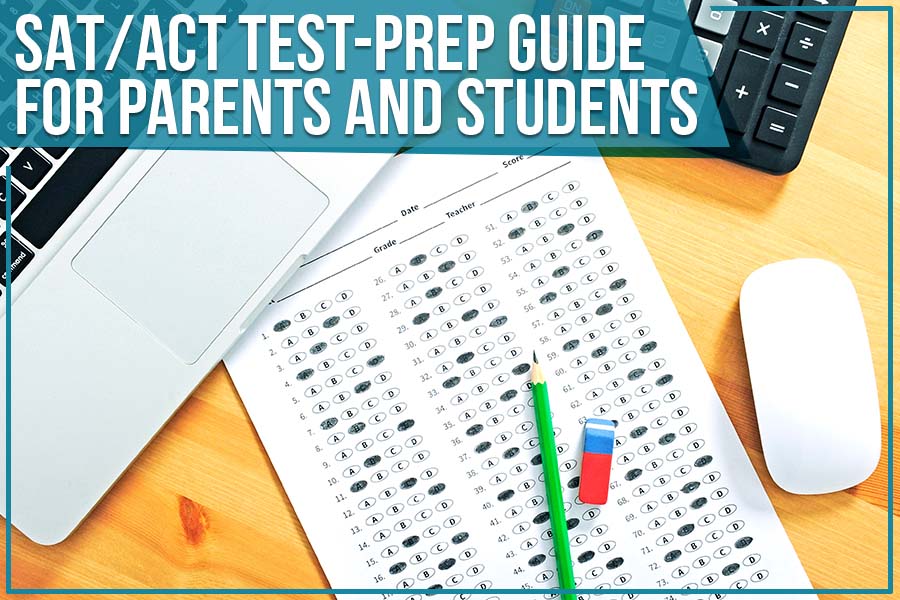
SAT/ACT Test-Prep Guide For Parents And Students
Is your college-bound student stressed about the SAT and ACT? It’s no wonder! Scoring well on these exams is an essential step in the journey to landing their dream college. U.S. universities respect both exams equally, and colleges use these scores to compare applicants before offering admission.
Although the tests cover similar content and are often used interchangeably, they are structured differently and emphasize distinct subject matter. At Groza, our recommendation is for students to take the SAT and then the ACT practice test to see which one they feel the most comfortable with. After both practice tests are completed, the student should compare their scores and focus on either the SAT or ACT. Depending on the child’s learning and thinking differences, one test may fit better than the other!
We know you’re busy and that preparing your child for these exams can feel overwhelming. Let our talented teachers remove the stress and guesswork! Our SAT and ACT Prep classes begin with practice tests to diagnose areas of strength and weakness and determine your child’s benchmark score.
This article discusses the important differences between the SAT and ACT while laying out a guide to help your student prepare for either one of the tests.
Comparing The SAT/ACT Exams
Universities widely accept the SAT and ACT exams, and both remain popular choices despite the fact that many colleges are opting to go “test-optional” or test-blind in response to the Covid-19 pandemic.
Despite this fact, reports indicate that within the last decade, an increasing number of students are electing to take the exams in preparation for their college admissions. Furthermore, many states still require completion of the SAT or ACT, and how well a student performs on these tests can be a critical factor in submitting a competitive application.
Outlined below are some of the key differences between the SAT and ACT.
| SAT | ACT | |
| Total Test Time | 3 hours 15 minutes (without writing and breaks included) | 3 hours 40 minutes (writing and breaks included) |
| Sections | • Reading Section: 65-minutes allotted to answer 52 questions • Writing and Language Section: 35-minutes allotted to answer 44 questions • Math (No Calculator) Section: 25-minutes allotted to answer 20 questions • Math (Calculator) Section: 55-minutes allotted to answer 38 questions |
• English: 45-minutes allotted to answer 75 questions • Math: 60-minutes allotted to answer 60 questions • Reading: 35-minutes allotted to answer 40 questions • Science: 35-minutes allotted to answer 40 questions • Writing (optional): 40-minutes allotted to answer one essay; does not affect your overall score |
| Scoring Equivalencies | 1600-1570 1560-1530 1520-1490 1480-1450 1440-1420 1410-1390 1380-1360 1350-1330 1320-1300 1290-1260 1250-1230 1220-1200 1190-1160 1150-1130 1120-1100 1090-1060 1050-1030 1020-990 980-960 950-920 910-880 870-830 820-780 770-730 720-690 680-650 640-620 610-590 |
36 35 34 33 32 31 30 29 28 27 26 25 24 23 22 21 20 19 18 17 16 15 14 13 12 11 10 9 |
| Cost to Test | $60 (writing included) $70 (no writing) | $52 |
If your child is a natural writer and enjoys literature, language arts, and verbal communication, they’ll probably prefer the ACT; while students with a penchant for mathematics tend to prefer the SAT. The math section on the SAT is split into a calculator and non-calculator assessment and includes a formula guide. The math portion contributes to around 50 percent of the student’s final SAT score. Read Thinking About College? Your SAT Prep Guide for more information on taking the SAT.
The ACT, on the other hand, has one math section that permits calculator usage. This portion accounts for about 25 percent of the student’s final overall score. It also includes an independent science section.
And don’t forget to check the testing requirements for the colleges your child is interested in applying to!
Students who prepare for their exams with a tutor will experience lower test anxiety because they have had the advantage of learning content, tricks, strategies, critical thinking, time management skills, and have taken plenty of practice tests. At Groza Learning Center, we understand how frustrating it can be to ensure your child is adequately prepared to get into the schools of their choice. Our world-class Test-Prep Program can guide them towards their academic hopes and dreams!
Studying for the SAT/ACT
Is your student ready to begin preparing for the SAT and ACT? Then this section of our blog is for them!
Here are six tips that every SAT/ACT test-taker should know:
1. Register Early!
Don’t delay your registration. The sooner you sign up, the greater your chances of getting a seat at your preferred test center. We recommend registering at least three months before the test date.
2. Familiarize Yourself With the Structure and Content
The various sections of the SAT and ACT assess different aptitudes and subject areas. It’s essential to become familiar with the actual content and how the questions will be presented. Each exam has unique question styles and formats — get comfortable with them ahead of time, so you’re not thrown off while testing.
Working one-on-one with a tutor, like the ones we offer at Groza, can ease your mind, and ensure you’re well prepared. 95% of our students get accepted into the school of their choice!
3. Master Test-Taking Strategies
Test-taking is a skill in itself! Here are some vital tips that will help get you through the exam with a higher score and more confidence:
- Answer the questions you know first. Make sure you mark the questions you’re going to come back to later!
- Never skip questions. There is no guessing penalty, so you’ve got nothing to lose by giving every question your best shot! Eliminate the answers you know are wrong, then select the best one. (P.S. Your “gut” response is usually correct.)
- Ensure you fully comprehend the question before answering. Reread the question prompt if you need to; after all that studying, make sure you’re not subconsciously answering a practice question!
- Write on your test booklet. You are free to write all over your ACT and SAT booklets. This can help you work through problems and track your progress.
- Pace yourself, and budget your time wisely. Spend a few moments on the easy questions and no more than a couple of minutes on the difficult ones. The ACT and SAT consist of several timed sections; it’s easy to lose track of time while focusing on your test, so pay close attention to how long you’re spending on each question. Additionally, make sure you take plenty of timed practice exams, so you’re used to these conditions.
Taking the SAT? Read Three SAT Tips and Tricks You Need to Know.
4. Take Full-Length Practice Exams
Take full-length practice exams of the ACT and SAT to get baseline scores. Identify your weakest areas, and make sure to prioritize these subjects during your study sessions. Depending on the score you want to reach and where your baseline is, we recommend allocating one to six months of consistent test-prep time. Self-reflect and pinpoint how long and how often you’ll need to study.
Use SMART goals to breakdown the material and help you reach your desired score:
S — your goal should be SPECIFIC and well-defined
M — your goal should be MEASURABLE with specific benchmarks in place
A — your goal should be ACHIEVABLE within the allotted time constraints
R — your goal should be RELEVANT and results-bound, so it guides you towards your ultimate pursuit (college admission)
T — your goal should be TIME-BOUND and broken down into weekly study sessions
5. Set a Study Schedule (And Stick to It)
Set your exam date(s), then put a schedule in place. Consider how much time you will have to dedicate to focused preparation each week. To prevent burnout, break up your study sessions into 30 to 90-minute focused intervals. Schedule these sessions into your weekly calendar and devote yourself entirely to test-prep during these times. If your friends or siblings are also preparing for the SAT and ACT, form a study group to help hold each other accountable!
Groza’s preparation process will ensure you’re ready to achieve your goal score on test day:
- Content — You’ll get a full understanding of the range of material and the nature of the test itself.
- Strategies — We will help you adopt strategies to optimize engagement, time-management, and question-by-question approach.
- Critical Thinking — You will absorb advanced reasoning habits and techniques for the test prep problems and questions through demonstration, discussion, and application.
- Practice, Practice, Practice! — You will complete homework, test simulations, and corrections to reinforce skills and learn from mistakes. We want you to go into test day feeling empowered and confident in your abilities!
6. Get Some Extra Help
We know that test prep can feel overwhelming and intimidating. You don’t have to go it alone!
Partnering with an award-winning Test-Prep Program, like that one we offer at Groza, will help eliminate your study-induced stress. Our world-class educators lead our program and navigate students through the test-prep process to achieve higher scores and confidence. These instructors know the material inside and out and will teach you valuable time-management and study skills you can carry through life!
Test with confidence and score with tenacity!
We invite you to call our team today at (310) 454-3731 or click here to schedule a free consultation.
